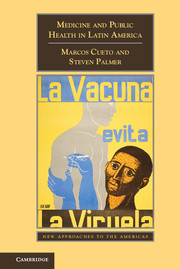Book contents
- Frontmatter
- Contents
- Acknowledgments
- Introduction
- Chapter One Indigenous Medicine, Official Health, Medical Pluralism
- Chapter Two National Medicines and Sanitarian States
- Chapter Three Making National and International Health
- Chapter Four Medical Innovation in the Twentieth Century
- Chapter Five Primary Health Care, Neoliberal Response, and Global Health in Latin America
- Conclusion
- Suggested Readings
- Index
Introduction
Published online by Cambridge University Press: 05 December 2014
- Frontmatter
- Contents
- Acknowledgments
- Introduction
- Chapter One Indigenous Medicine, Official Health, Medical Pluralism
- Chapter Two National Medicines and Sanitarian States
- Chapter Three Making National and International Health
- Chapter Four Medical Innovation in the Twentieth Century
- Chapter Five Primary Health Care, Neoliberal Response, and Global Health in Latin America
- Conclusion
- Suggested Readings
- Index
Summary
All students of Latin American and Caribbean history learn early that disease and suffering, health and medicine, are woven into the main plot lines. This is true from the demographic collapse that decimated indigenous populations during and after the encounter known as the Conquest to the shocking health indicators and rural immiseration motivating modernizationists, revolutionists, and neoliberals in the post–World War II era. The social and political consequences of disease and health have been at the center of hemispheric history. Until recently, however, questions of medicine and healing were relegated to the margins of serious discussion among historians. When health and disease were the focus, they were framed by other specialties – the mortality disaster that befell the Aztec and Inca populations, for example, was an issue identified and debated by geographers and demographers. The specialized historical discussion of medicine, meanwhile, was the preserve of a small and isolated group – mostly retired physicians interested in curiosities of pre-Columbian healing, hagiographic portraits of the great men in their profession, or the charting of the arrival in Latin America of technological breakthroughs made in the metropolitan centers of Europe and the United States.
That has changed dramatically over the past thirty years. It is now possible to read a history of U.S. intervention in Cuba told as the history of yellow fever on the island, to explore an alternative African-oriented intellectual history of Latin America and the Caribbean via the story of skilled surgeons who were slaves or former slaves and continued to incorporate African-derived practices into their healing arsenal, or to learn how Latin American medical scientists carved a niche for themselves in international networks of knowledge and power. Such studies are possible because the history of medicine and health in Latin America and the Caribbean has become an important field of study practiced by professionally trained historians who are part of a great global flowering in the social and cultural history of medicine, and in science and technology studies. Valuable research on new problems, using new sources, has been carried out, and a new historiography has matured, perhaps most notably in the pages of the Brazilian journal História, Ciências, Saúde – Manguinhos, which first appeared in 1994.
- Type
- Chapter
- Information
- Medicine and Public Health in Latin AmericaA History, pp. 1 - 9Publisher: Cambridge University PressPrint publication year: 2014

